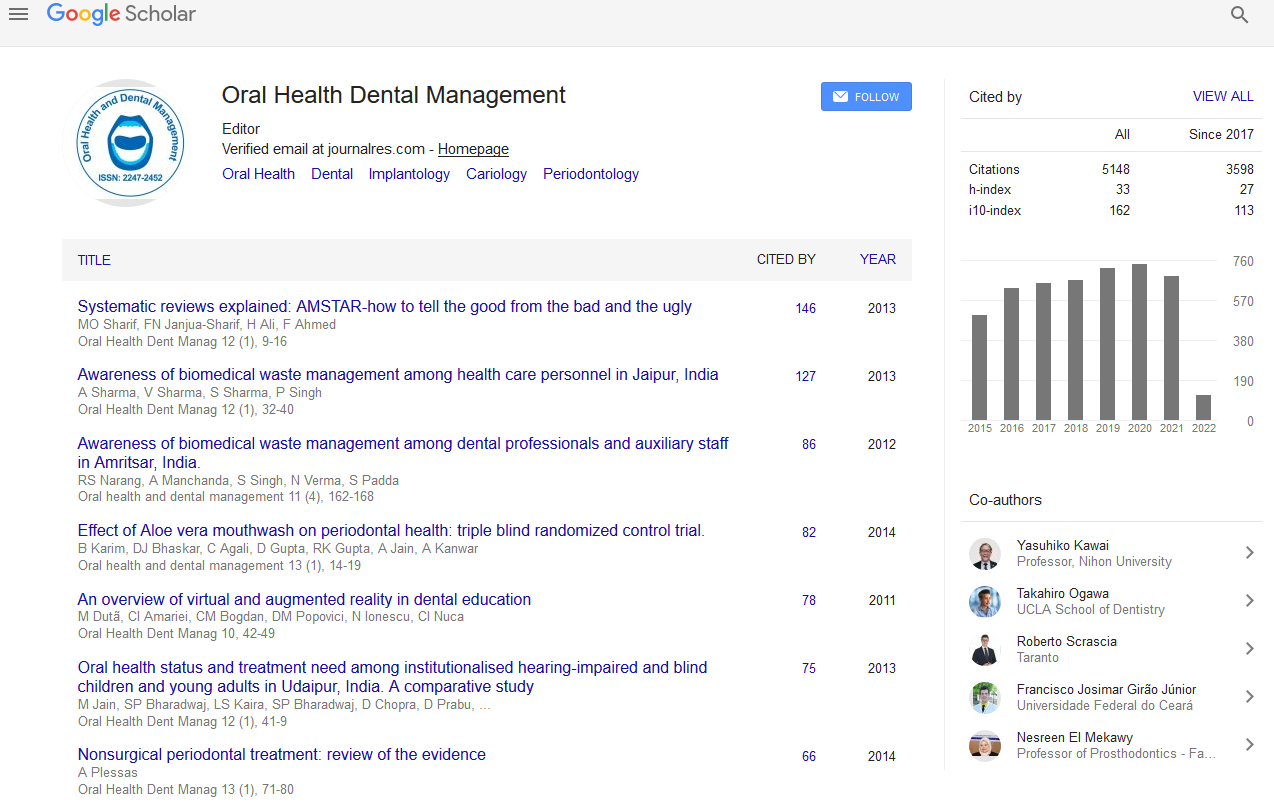Indexed In
- The Global Impact Factor (GIF)
- CiteFactor
- Electronic Journals Library
- RefSeek
- Hamdard University
- EBSCO A-Z
- Virtual Library of Biology (vifabio)
- International committee of medical journals editors (ICMJE)
- Google Scholar
Useful Links
Share This Page
Journal Flyer

Open Access Journals
- Agri and Aquaculture
- Biochemistry
- Bioinformatics & Systems Biology
- Business & Management
- Chemistry
- Clinical Sciences
- Engineering
- Food & Nutrition
- General Science
- Genetics & Molecular Biology
- Immunology & Microbiology
- Medical Sciences
- Neuroscience & Psychology
- Nursing & Health Care
- Pharmaceutical Sciences
Hydroxyapatite/Pectin nanocomposite as filler material for dental applications: Antibacterial properties and In vitro bioactivity of composites
3rd Euro Congress and Expo on Dental & Oral Health
June 16-18, 2015 Alicante, Spain
D Gopi1 and L Kavitha2
Posters-Accepted Abstracts: Oral Health Dent Manag
Abstract:
Dental caries is a widespread chronic and world-wide oral disease. In dental treatment, composite biomaterials are used as fillers to restore teeth. A broad range of inorganic fillers are commercially available. Among them, hydroxyapatite [Ca10(PO4)6(OH)2, HAP] can be widely used as biomaterial due to the chemical similarity to teeth. Therefore, synthetic HAP would seem a good choice as the inorganic filler to be used in dental restoration or bone implants. Concerning the human health and the environment, the use of hazardous materials is replaced by green chemical substances. The present study deals with a facile and efficient green route for the synthesis of HAP/pectin nanocomposite using pectin as a reinforcing material which was extracted from the peel of bitter orange fruits. The pectin concentration involved in the synthesis plays a major role in the behavior of crystallinity, purity, morphology as well as biological property of the as-synthesized HAP/pectin nanocomposite. The extracted pectin and the as-synthesized nanocomposite were characterized by various analytical techniques such as 1H NMR, 13C NMR, etc. The In vitro apatite formation on the surface of the as-synthesized nanocomposite in simulated body fluid for 7 days showed an enhanced bioactivity. The antimicrobial activity was investigated using various microorganisms. All the results revealed the formation of pure, low crystalline and discrete granular like HAP/pectin nanocomposite with enhanced biological and antimicrobial activities. Hence the as-synthesized nanocomposite can act as a better filler material in the field of dentistry. Keywords: Hydroxyapatite; Pectin; Nanocomposite; Green route; Bitter orange; Bioactivity
Biography :
Prof. Dr. D. Gopi completed Ph.D., from the Department of Analytical Chemistry, University of Madras, Chennai and continued his research as an Invited Scientist in Korea Electrotechnology Research Institute (KERI), South Korea (2002?2004). Later he joined as Assistant Professor of Chemistry at Periyar University, Salem in 2004. He is presently working as Professor of Chemistry and Additional Coordinator of Centre for Nanoscience and Nanotechnology, Periyar University. His research is on the synthesis and coating of bioceramics for the development of potential and economically viable biomedical implants. He has 110 publications with h-index of 20, in the peer reviewed international journals. He has four book chapters with international publishers like Elsevier and Springer and has filed 2 Indian and 1 US patents. He has produced 34 M.Phil.?s and 14 Ph.D.?s and has collaborations with international scientists. His proficiency and contributions in the scientific research has fetched him various prestigious awards like ?Tamil Nadu Scientist Award (TANSA)? in Medical Sciences (2013), ?Research Award in Chemistry (2014- 2016)? from the University Grants Commission, New Delhi, India, ?Sir. C.V. Raman Award (2013)? from Periyar University, Salem, and ?Young Scientist Fellowship (2009)? from the Department of Science and Technology, New Delhi, India. He is the Fellow of the Royal Society of Chemistry, London, the world?s leading chemistry community and also a Fellow of Academy of Sciences, Chennai, India. He has mobilized grants more significantly from various funding agencies in India to the tune of 2.5 crores, independently. He has presented many research papers in International conferences worldwide.

